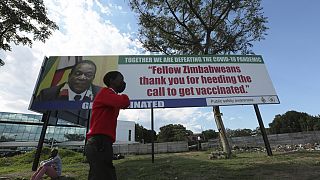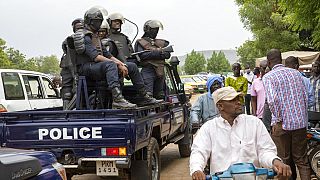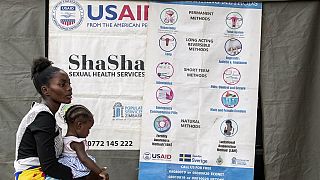Zimbabwe
Campaigners in Zimbabwe have been trying to persuade hesitant members of Apostolic church groups to get vaccinated against COVID-19, amid pervasive disinformation.
"It's a very big challenge, this issue of vaccination. People are receiving misleading information, especially from social media, about vaccination," said campaigner Yvonne Binda.
Binda and her colleague, Alexander Chipfunde, spoke to a congregation dressed in pristine white robes in Seke, some 40 kilometers (25 miles) from Harare, telling them not to believe what they've heard about COVID-19 jabs.
Apostolic groups that infuse traditional beliefs into a Pentecostal doctrine are among the most skeptical in Zimbabwe when it comes to COVID-19 vaccines, with an already strong mistrust of modern medicine.
Many followers put faith in prayer, holy water and anointed stones to ward off disease or cure illnesses.
There has been little detailed research on Apostolic churches in Zimbabwe but UNICEF studies estimate it is the largest religious denomination with around 2.5 million followers in a country of 15 million.
The conservative groups adhere to a doctrine demanding that followers avoid medicines and medical care and instead seek healing through their faith.
More than 80% of Zimbabweans identify as Christian, according to the national statistics agency, but there's no one-size-fits-all solution to convincing hesitant religious citizens to get vaccinated.
While mandates — a blunt no vaccine, no entrance rule — might work for some churches, another approach may be needed for Apostolic groups, which generally worship outdoors.
Binda is one of nearly 1,000 members of various religious groups recruited by the Zimbabwean government and the UNICEF to try gently changing attitudes toward vaccines from within their own churches.
While slow and steady might be best in dealing with some religious hesitancy, the situation is urgent in Africa, which has the lowest vaccination rates in the world.
Zimbabwe has fully vaccinated 15% of its population, much better than many other African nations but still way behind the U.S. and Europe.
Addressing an audience of churchgoers Sunday, the country's deputy health minister hailed the economic benefits of getting jabbed.
"Once we are vaccinated our economy will open up in full throttle," he said.











11:05
New era of sovereignty in Mali's gold sector [Business Africa]
01:37
UN agricultural fund calls for adaptation financing for small-scale farmers
Go to video
IOC sets election timetable to succeed Thomas Bach
11:05
Ethiopia: Electromobility, turning point or illusion? [Business Africa]
02:29
Zimbabwe's baobab trees offer lifeline to rural communities devastated by climate change
01:50
Former poacher spreads conservation message in rural Zimbabwe